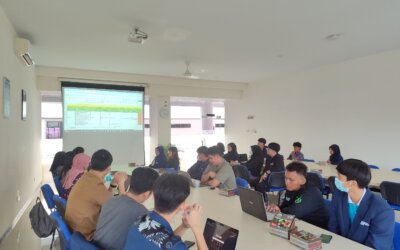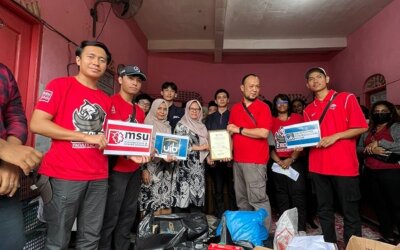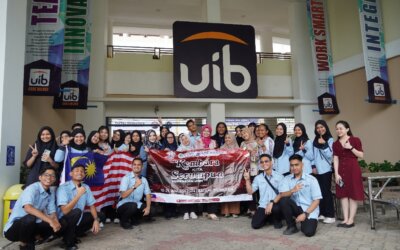Language is a window that introduces us to the broader world. In the Indonesian context, Indonesian is not only a medium for us to communicate but also a gateway to understanding Mother Earth’s rich culture and fascinating diversity. Amid the era of globalisation, interest in learning Indonesian for Foreign Speakers (BIPA) is increasing. BIPA is no longer just language learning but also a journey that allows individuals from various parts of the world to explore the uniqueness and beauty of Indonesian culture. BIPA programs offer more than just grammar instruction; they open a window to Indonesian society’s traditions, culture, history, arts and everyday life. One of
the advantages of BIPA learning is its holistic approach, which covers grammar and vocabulary and involves BIPA students in cultural activities such as cooking traditional dishes, learning regional dances, or exploring local beliefs. This deepens their understanding of Indonesia and enriches their experience of Indonesian life. The benefits of learning BIPA are also comprehensive. Apart from improving communication skills in Indonesian, participants also have the opportunity to engage in cross-cultural activities, expand social networks, and deepen their understanding of the tolerance and diversity that exist in Indonesia.
The importance of learning BIPA is not only for those who want to understand Indonesia in depth but also for building diplomatic and economic relations between nations. In this global era, the ability to communicate across cultures is the primary key to building harmonious and mutually beneficial cooperation between countries. It cannot be denied that BIPA learning has become a bridge that allows the exchange of cultural values, knowledge and experiences between Indonesia and the world. In the process, not only participants learn, but also teachers gain new insights through interactions with participants from diverse backgrounds.
As a country with extraordinary cultural wealth, Indonesia is wide open to welcome anyone who wants to understand the beauty of its language and culture through BIPA learning. This initiative is a step toward introducing Indonesia to the world and opening the door for closer cooperation between nations.
To bring BIPA learning to a higher level, the Batam International University (UIB) Cultural and Language Development Institute has held various programs to integrate the richness of Indonesian culture into the learning process. UIB has opened opportunities for international students to deepen their understanding of the Indonesian language and culture. Two Darmasiswa RI program students from Ghana and France are currently undergoing a 10-month program aimed at studying Indonesian culture and language. Apart from that, an international student from the UIB Tourism study program is taking part in the BIPA learning program. Not only that, but two BIPA students from Korea are in Batam and are professional Korean language teachers. Their presence in the Indonesian language learning program provides rich dynamics and diversity in interaction, teaching, and learning in the BIPA learning environment at UIB.
Learning Indonesian for Foreign Speakers at UIB uses the scaffolding method, which gradually assists students in understanding complex material. This approach strengthens the foundation of understanding, from basic grammar concepts and vocabulary introduction to exploring more complex sentence structures and deeper nuances of language. BIPA learning cannot be separated from Indonesian traditions and culture in the learning process, like when studying the use of language in various expressions. BIPA teachers at UIB use dangdut songs as a medium for learning. The songs used were Kopi Dangdut, depicting happy expressions; My Pacarku Five Steps, describing arrogant expressions; Buaya Buntung, representing angry expressions; and Kejora, representing sad expressions.
In learning Indonesian for foreign speakers at UIB, teachers use the book “My Indonesian Friends”, which contains competencies appropriate for BIPA students. In the book, there is a section that presents Indonesian insight. One of the things BIPA teachers tell at UIB is the story of the legend of Roro Jongrang. Through this story, the teacher not only introduces the legend but also the cultural values inherent in it. The tale of Roro Jongrang reflects Indonesia’s rich mythology, ethical values and cultural identity, providing a new dimension for students to understand Indonesia’s cultural diversity. This deepens their understanding of Indonesian and enriches their learning experience.
This BIPA learning also became a place for cultural exchange where students from Korea shared presentations about comparing the weather situation in Korea and Batam, their dreams when they were in Korea and their situation after moving to Batam. He also told how he used public facilities and his journey to Batam using a ferry via Singapore. This kind of presentation provides an understanding of environmental differences and enriches the learning experience with an accurate and in-depth perspective.
One of the challenges faced in learning Indonesian for Foreign Speakers (BIPA) is when there is a language barrier between BIPA students from Korea who are not fluent in English or Indonesian and teachers who do not mastered Korean. To overcome this, teachers use online translation assistance to explain some words and provide instructions to students. This process helps students understand the material and provides a well-rounded learning experience for teachers who learn much about the Korean language.
Learning Indonesian for Foreign Speakers (BIPA) at Batam International University (UIB) teaches language and embraces cultural diversity. Through a holistic program that includes dangdut songs and legendary stories and addresses language challenges, UIB builds strong bridges between world cultures. This initiative proves how BIPA at UIB is not just language learning but also a journey to knit and enrich cultural diversity.
Writer :






